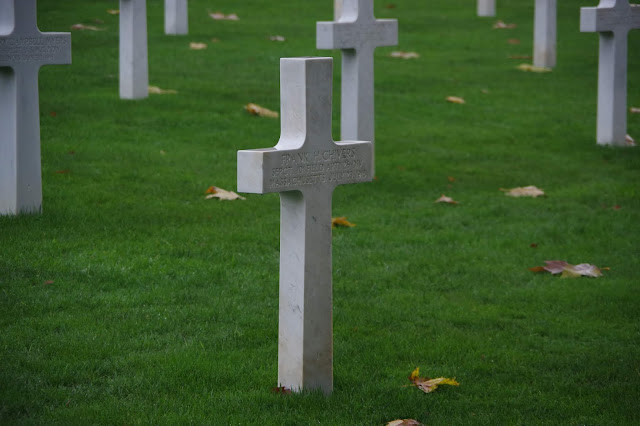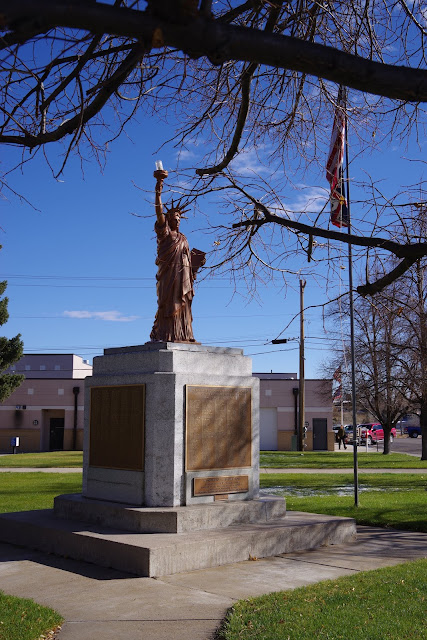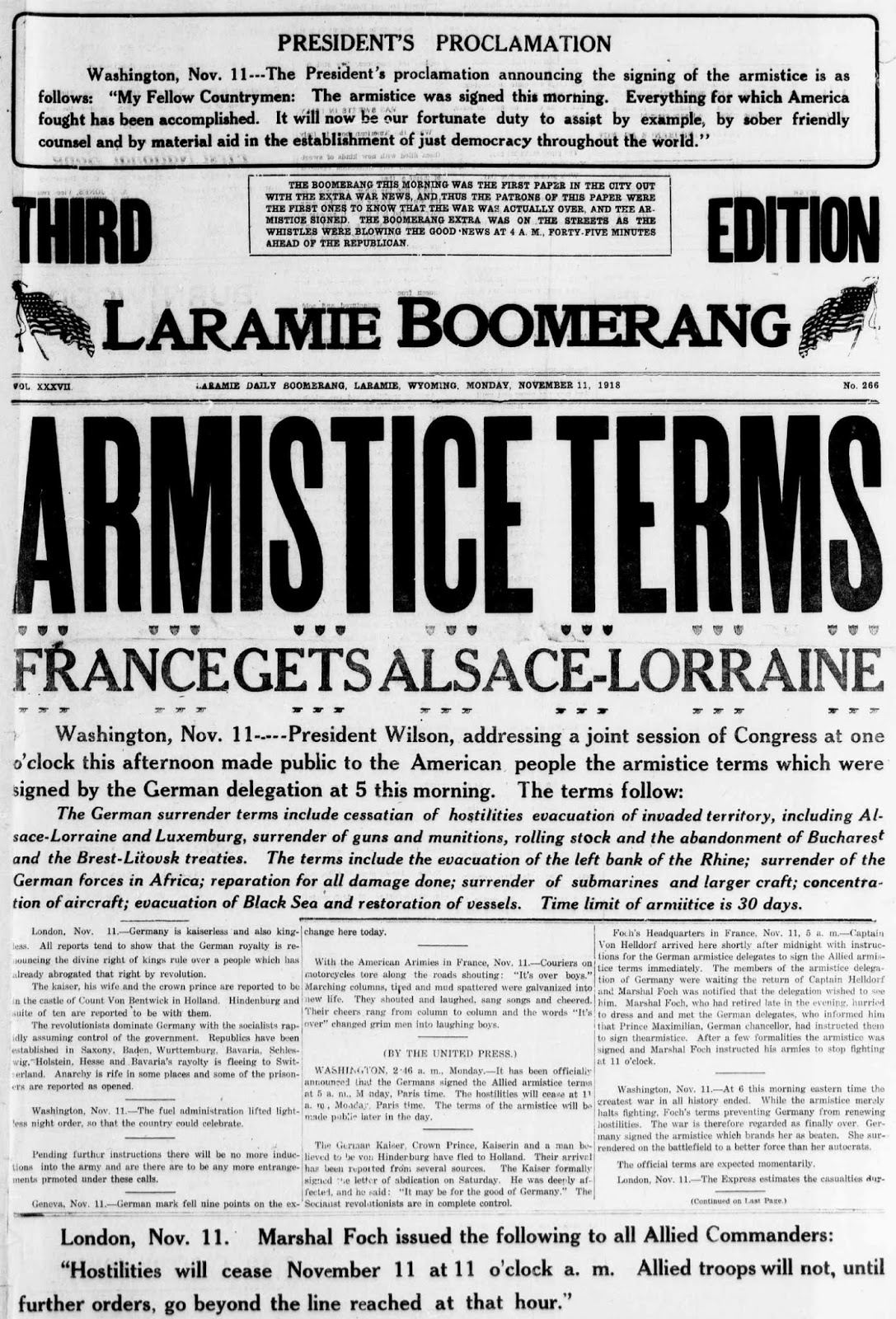"To Our Hero's". Cemetery Wall in Paris, France. France's contribution to the Allied victory in World War One surpasses that of any other Allied nation. . .something you'd sometimes not realize if you only read the English language accounts of the war. MKTH photograph.
On this date in 1918, the Great War came to an end.*

Usually such posts are highly retrospective, and I suppose this one will be to a degree, but not in the "oh what a terrible waste" fashion that so many of them are. The "Oh, What A Lovely War" view of the war popularized by the posthumous post World War Two publication of Siegfried Sassoon's poetry is largely baloney.** In reality, the view taken earlier, that Germany was a horrible world menace on the European stage ruled by its military and a few autocrats who cared little about the rivers of blood they were spilling in order to impose Germany's imperial will on Europe is much closer to reality.

Indeed, its telling that in order to being the peace about, it had to occur in the context of a German revolution. That revolution threatened for a time to make former Imperial Germany into a communist Soviet state, and put the new provisional government in the position of having to put down a left wing revolution. That alignment, and the unrepentant view of Germany's hard right and its military would guaranty a second war, not the supposedly "harsh" terms of the Versailles Treaty. A hard won victory, therefore, would not bring lasting peace, but that too really isn't for the reasons so often cited.

Indeed, had the provisions of the Versailles Treaty been more strictly enforced, World War Two would not have come about. And had the conditions of the treaty been arrived upon more quickly, when Germans had no choice but to admit that they'd been fully defeated on the battlefield and the revolution only saved Germany from the Allies entering German soil in action, as they did in 1945, the excuse that the treaty became would not have occurred. And the treaty did become a German excuse, and the "stabbed in the back" myth would arise, but more than anything it was the smashing of the Old Order that brought about the second war.
But was the collapse of the imperial order in nations that had not moved sufficiently towards democratic rule as populations moved from rural peasantry towards industrial laborers that really created the mess that would result in World War Two.
Almost every European nation had faced this in some fashion, but some had handled it much better. Nations like Germany, Austro Hungaria, and Russia, however, had not. Indeed, they'd not only failed to accommodate the new world of a more educated working class, but in Germany's case they'd actually arrived upon an autocratic imperial state late. Nations like France and Germany, in contrast, had moved more and more towards real democratic rule much earlier, and therefore the forces that would gather in the vacuum of the demise of the Old Order would not impact them in the same degree, or indeed in the democratic UK, at all.

In nations like Germany, Russia and (for WWI Allied) Japan, however, the demise of the Old Order would create a vacuum that would be filled by a vicious extreme forces, communistic or fascistic in nature, that opposed democratic rule and glorified martial violence. In some places those forces would oppose any hint at restoring the Old Order, as in Russia, in others they'd co-opt elements of it, as in Italy. In all such places, the result was to bring about disaster in every form.
When that war came, much of what the world had become acclimated to in the First World War would play out in horrific fashion. And much of that can be blamed on Germany, which had often acted just as barbarously in the Great War as they were to act in World War Two.
Germany had in large measure brought that defeat in the Great War upon itself. While people like to look back for some reason and imagine the Germany military of World War One and World War Two as hyper competent, quite the opposite was often true. While the Spring 1918 offensive was absolutely brilliant, Germany's dithering with the collapse of Russia guaranteed that a million men it desperately need on the Western Front would not be available. If Germany was stabbed in the back, it's own autocratic class and military leadership did the stabbing, as Germany set about advancing in a country it had already defeated and had helped push into civil war. It acted as if it had won the war, when in fact it had not.
Officers of the newly crated Third Army which was formed in France too late to see combat, but which would go on to occupation duty in Germany.
Of course the arms of the Western Allies cannot be ignored in that role. The ability of the British to rebound in the face of the 1918 offensive was magnificent, even if the common British view that they seemingly won the war on their own is exaggerated. The long suffering French deserve huge credit for the defense of their own country and carrying the war through to the end, which included the contribution of Marshall Foch whose coordinating the efforts of the Allies was a monumentally difficult task.
Drafted inductees into the U.S. Army, Los Angeles California, November 11, 1918. The U.S. continued to draft right up until the end of the war. I don't know what happened to men brought in this late.
And the US deserves much more credit than it is typically given by non American historians even if its military leadership deserves much more criticism than American ones will give it. The surprising ability of the U.S. to create a 4,000,000 man Army in just over a year's time, and to deploy 2,000,000 of them to France (and Italy) was a stunning achievement. The individual fighting qualities of the American soldier were also hugely impressive, although much of that was due to the soldier being very green and, frankly, poorly lead.
Paris crowd, November 11, 1918.
The U.S. Army, in fact, was committed to action in a manner that was to prove wasteful of lives as the American leadership persisted in the belief that there were no lessons to be learned from the Allies. The American effort was only able to get away with this as the Army was thrown into action at a time when massive force was likely to prevail against the Germans, even if it proved to be hugely costly. Indeed, real questions should be raised as to why the American leadership continued to persist in this fashion when even the very early efforts demonstrated how bloody such actions would be, even if the American willingness to endure the bloodshed, much like the Union's willingness to endure it in the latter half of the Civil War, guaranteed that an Allied victory would occur.***
American Red Cross works gathering in London for a parade, November 11, 1918, in honor of the war's end.
And it did so bring it about, even if it did not do so single-handedly. That sacrifice should not be forgotten.
_________________________________________________________________________________
*Before anyone points it out, yes I know that a state of war continued on until the execution of the Versailles Treaty, or even later if you consider that the US had to declare the war to be over unilaterally after the U.S. refused to enter into the treaty. Indeed, I've already been "corrected" on that once.
Well, whatever, but the war ended on this day. Germany wasn't going back to fighting under any circumstances, and couldn't, after entering into the Armistice on this day.
**The morose British war poet view of the war is largely a post World War Two view of it that reflects more than anything the state of the British mind following World War Two, which left Britain with an empire that it obviously was going to leave and with an utterly wrecked economy.
***The U.S. Navy, on the other hand, was really effectively commanded in the Great War and contributed enormously to a reduction of the effectiveness of German submarines. It's role, however, is largely forgotten.
Postscript
This day is also marked as Polish independence day, although it would be just as easy to pick a date several weeks earlier and indeed would perhaps be more accurate as various Polish political bodies had declared independence from Russia and Germany by this time.
There are several sad deaths often noted about the day. Augustin Trebuchon was the last French soldier to die in the war. He was 40 years old and had joined the French Army in August, 1914. A shepherd by trade, he'd fought the entire war. He had occupied the role of messenger throughout the war and knew that an agreement had been signed even when his unit went into action that morning, committed to an attack even with the knowledge that peace was likely to be soon agreed upon. That battle went on until 6:00 p.m., a good seven hours after the armistice had been signed, when the unit received word that the fighting had ended. French officials originally recorded his death as November 10, as they were embarrassed to admit that they had been fighting when peace was imminent.
George Lawrence Price was the last Canadian soldier killed. The 25 year old private originally from Nova Scotia was killed in a small unit action by a German sniper when they were reconnoitering some Belgian houses and discovered German machinegunners. He'd come into the Canadian army as a conscript the prior year, having been conscripted from his then home in Saskatchewan.
Private George Edwin Ellison was the last British soldier killed. The British cavalryman, age 40, had served for a time as a per war soldier and had been recalled into his old unit, the 5th Royal Irish Lancers, in 1914.
Charles I, the Austro Hungarian Emperor, announced he would give up the Austrian crown. He would do the same in regards to Hungary two days later. He never actually abdicated in hopes he'd be recalled. He wasn't.
Counter campaigns against Dutch socialist occured in the Hague.
British, Canadian and American troops, numbering about 600, engaged with a Red Army force of 2,500 at Tulgas, where the Armistice had no effect. About 1/2 the force were Americans. The combined unit had been attacked but after two days launched an Assault, 20th Maine at Gettysburg style, and drove the much larger Red unit back. Red Army casualties nearly exceeded the number of men total in the Allied force.




































































































































